 Petzlover
Petzlover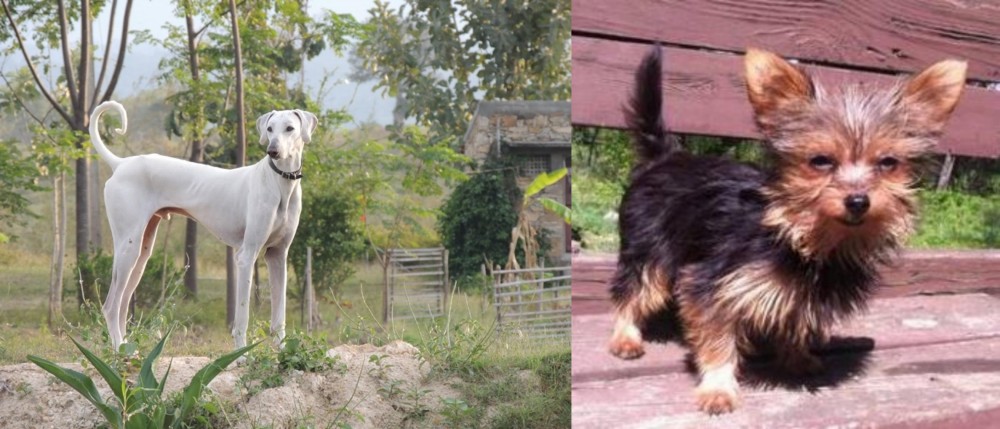 Chippiparai is originated from India but Chorkie is originated from United States. Chippiparai may grow 54 cm / 22 inches higher than Chorkie. Chippiparai may weigh 11 kg / 25 pounds more than Chorkie. Chippiparai may live 3 years more than Chorkie. Both Chippiparai and Chorkie has almost same litter size. Both Chippiparai and Chorkie requires Low Maintenance.
Chippiparai is originated from India but Chorkie is originated from United States. Chippiparai may grow 54 cm / 22 inches higher than Chorkie. Chippiparai may weigh 11 kg / 25 pounds more than Chorkie. Chippiparai may live 3 years more than Chorkie. Both Chippiparai and Chorkie has almost same litter size. Both Chippiparai and Chorkie requires Low Maintenance.
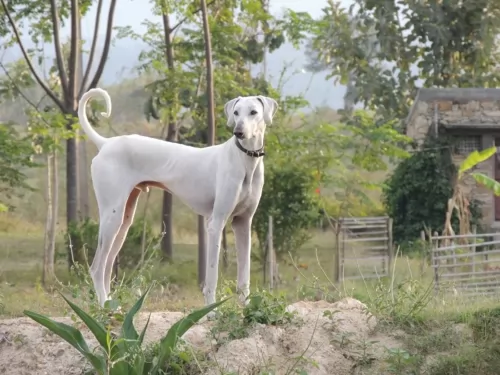 The Chippiparai is a working dog found in India and until recently there has been little interest in the purity of any breed, but rather only an emphasis on the abilities of the dog. They are only beginning to research the origin and history of their native dogs such as the Chippiparai. Not much is known about the origin of the breed except that it is found almost exclusively in Tamil Nadu and Keraia in the southern part of the subcontinent of India. Other than this there is much speculation about the breed’s origin but very little-known facts. It is indeed an ancient breed; however, its origin could be thousands of years ago or simply hundreds of years ago.
The Chippiparai is a working dog found in India and until recently there has been little interest in the purity of any breed, but rather only an emphasis on the abilities of the dog. They are only beginning to research the origin and history of their native dogs such as the Chippiparai. Not much is known about the origin of the breed except that it is found almost exclusively in Tamil Nadu and Keraia in the southern part of the subcontinent of India. Other than this there is much speculation about the breed’s origin but very little-known facts. It is indeed an ancient breed; however, its origin could be thousands of years ago or simply hundreds of years ago.
• Perhaps it is a descendant of the Saluki as it resembles this breed quite a bit. It has been believed for some time that the Saluki is the original sighthound and the source of all sighthound breeds. The Saluki was very popular in the Middle East, especially in Persia and Arabia from which it could easily have spread to India. It would then have been shared from Northern India to Southern India where the Chippiparai is found.
• Perhaps the Chippiparai is a descendent of sighthounds from Central Asia and Afghanistan – the Tazi, Taigan, Hortaya Borsaya or the Afghan Hound. This part of Central Asia had more trade, influence and contact with the Indian subcontinent early in their history than with any other region. The Chippiparai is considered by some to be more like these sighthounds than like the Saluki and the interaction between these regions has a much longer history than the Middle East and India.
• It is also speculated that the Chippiparai might have been developed completely and uniquely from the local street and working dogs. With the civilization of India being one of the oldest in the world, it is considered a possibility that the Chippiparai is the descendent of the Harappan hunting dogs that probably were developed by the Indus Valley or Harappa roiling class.
Wherever the Chippiparai came from, they were the exclusive property of the wealthy and ruling castes. These upper castes were the only ones that could legally hunt with dogs or afford to feed one. The royal classes of Tiruneivell, Thanjavur, and Madurai all fed the popularity of the breed among the upper castes. They were coursing dogs used to chase down the prey once it was sighted. The Chippiparai are incredibly fast runners and would catch almost any prey and either hold it or kill it for their hunter. The Chippiparai, when not hunting, had to be chained so they would not chase any small animal that they saw. This confinement also added to the purity of the breed as random breeding was prevented.
The southern part of the Indian subcontinent is extremely hot with routine temperatures over 100’. The Chippiparai was developed to withstand these extreme temperatures and is more heat tolerant than most any other breed. They also need very little food and are resistant to the many parasites and diseases found in southern India.
Harboring the belief that Indian dogs were not as good as European ones, the occupying countries of Portugal, France, and Britain, had no interest in the Chippiparai, again leaving the breed to develop naturally on their own with little or no interbreeding. They also received no formal recognition because Indian culture only valued the dog for its working abilities. There was no Indian Kennel Club until 1956.
The Chippiparai is now very rarely and only found in the area of its birth. Many believe the breed is in danger of becoming extinct and even though it is now registered with Indian Kennel Clubs it is not often shown in their dog shows. Lovers of the breed are now attempting to get Indians to recognize that the Chippiparai is a great companion animal and attempting to save the breed.
 The Chorkie is a very popular little dog but he is not a purebred. The Chorkie was developed by crossing the Yorkshire Terrier with the Chihuahua. Probably the most popular Chorkie ever was the Taco Bell dog in the 1990s. This hybrid is a young breed created in the late 1900’s. These small, toy dogs are great lapdogs. It’s not possible to know the exact heritage of the Chorkies but the initial crossing of the two breeds occurred in the early part of the 20th century.
The Chorkie is a very popular little dog but he is not a purebred. The Chorkie was developed by crossing the Yorkshire Terrier with the Chihuahua. Probably the most popular Chorkie ever was the Taco Bell dog in the 1990s. This hybrid is a young breed created in the late 1900’s. These small, toy dogs are great lapdogs. It’s not possible to know the exact heritage of the Chorkies but the initial crossing of the two breeds occurred in the early part of the 20th century.
The Chorkie makes a great indoor pet best suited for the single or elderly person. Not because the Chorkie does not like children but because they are so small they can be easily injured by children. They are continuing to grow in popularity all the time among those who enjoy the new designer dogs.
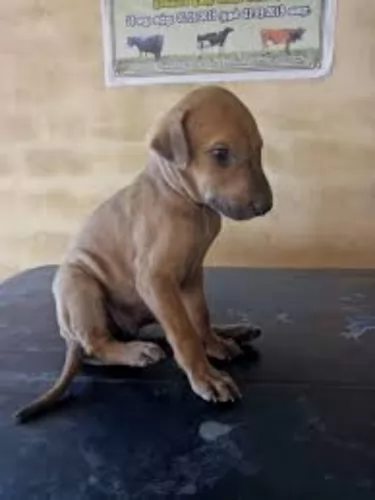 The Chippiparai is a typical sighthound although their size and appearance will vary more than that of registered purebred sighthounds. Typically, they will have a long, domed head with small erect ears and dark eyes. Their muzzle will be as deep and wide as the skull but longer. Their legs are straight and long, their chest is roached back and deep, giving them, an appearance very similar to a greyhound or other sighthound.
The Chippiparai is a typical sighthound although their size and appearance will vary more than that of registered purebred sighthounds. Typically, they will have a long, domed head with small erect ears and dark eyes. Their muzzle will be as deep and wide as the skull but longer. Their legs are straight and long, their chest is roached back and deep, giving them, an appearance very similar to a greyhound or other sighthound.
They have a long curly tail, and their coat can vary greatly in color. They are medium sized, and their coat is short, shiny and close. He is very slender and sleek, which along with his long legs gives him that incredible speed. They are thin with visible ribs.
 As mentioned previously the Chorkie is a mix between the Yorkshire Terrier (Yorkie) and the Chihuahua. They Tend to look more like the terrier than the Chi with a small head carried high on a well-proportioned body, with the long silky hair of the Yorkie. Their head carried the shape of the Chihuahua. Like the Chihuahua, they have mostly pointed ears although some Chorkies have droopy ears. The Chorkie coat is silky, long, and can be in a variety of colors. The ears are either fringed like the Yorkie or smooth like the Chihuahua.
As mentioned previously the Chorkie is a mix between the Yorkshire Terrier (Yorkie) and the Chihuahua. They Tend to look more like the terrier than the Chi with a small head carried high on a well-proportioned body, with the long silky hair of the Yorkie. Their head carried the shape of the Chihuahua. Like the Chihuahua, they have mostly pointed ears although some Chorkies have droopy ears. The Chorkie coat is silky, long, and can be in a variety of colors. The ears are either fringed like the Yorkie or smooth like the Chihuahua.
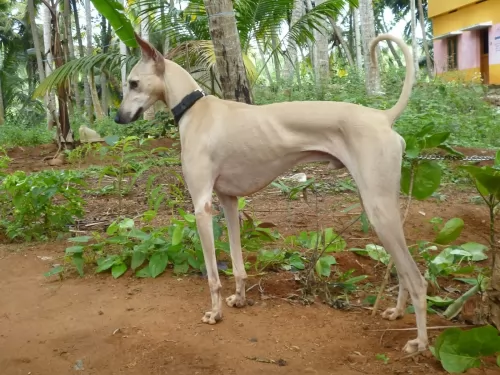 The Chippiparai is a loving, gentle family dog if well socialized, well trained and well exercised. They are very intelligent and need human companionship. Once they are living with a human family, they are very protective of that family. They are for the most part peaceful and quiet dogs. They are loyal and loving but they are not overly affectionate. Cuddlers they are not, and they do not like to play rough with children.
The Chippiparai is a loving, gentle family dog if well socialized, well trained and well exercised. They are very intelligent and need human companionship. Once they are living with a human family, they are very protective of that family. They are for the most part peaceful and quiet dogs. They are loyal and loving but they are not overly affectionate. Cuddlers they are not, and they do not like to play rough with children.
Accepting and loving within the family, the Chippiparai are equally hesitant and shy around strangers. They can be suspicious, but they are not aggressive. They are just very aloof with strangers, yet they hardly ever bark.
 Remember that the Chorkie is a cross breed and not a purebred. Its temperament is that of a mixed breed dog which is usually laid back and mellow. The Chorkie might bark a lot as both the Yorkshire and the Chihuahua are known to bark. It can carry the traits of either or both of its parents.
Remember that the Chorkie is a cross breed and not a purebred. Its temperament is that of a mixed breed dog which is usually laid back and mellow. The Chorkie might bark a lot as both the Yorkshire and the Chihuahua are known to bark. It can carry the traits of either or both of its parents.
The Chorkie is a great lap dog though he can be stubborn and wear their owner out with all their energy. They are playful and willful and need strong leadership despite their small size. They will bark at anything they find to be suspicious. Despite their size they are highly intelligent and very loyal, affectionate dogs. They love their people and will not like it if you leave them alone very often. They are quite brave to the point of being reckless and can be aggressive toward dogs a lot bigger than they are. Due to their courage and their barking they are great family dogs.
 There are no clinical studies regarding the health and health history of the Chippiparai, so little is known about their long-term health. However, most who know the breed, believe it is an incredibly healthy one. They seem to have a lot less genetically transmitted health issues than other purebreds. Because of their isolation for centuries in India, they have developed immunities and resistance to most parasites and diseases other dog suffer from.
There are no clinical studies regarding the health and health history of the Chippiparai, so little is known about their long-term health. However, most who know the breed, believe it is an incredibly healthy one. They seem to have a lot less genetically transmitted health issues than other purebreds. Because of their isolation for centuries in India, they have developed immunities and resistance to most parasites and diseases other dog suffer from.
Because of this you should look for the types of issues that occur in dogs of this size and build. Have them tested by the Canine Eye Registration Foundation and the Orthopedic Foundation for Animals.
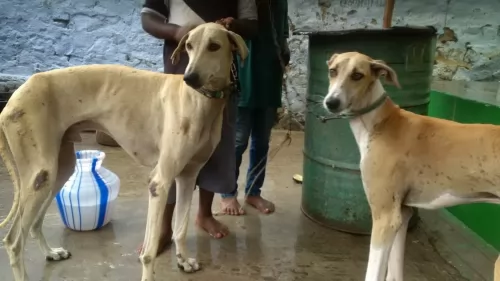 Do not overfeed your Chippiparai. Feed twice a day and no more than a total of 2.5 cups of high quality dry food.
Do not overfeed your Chippiparai. Feed twice a day and no more than a total of 2.5 cups of high quality dry food.
As mentioned previously the Chippiparai seems to have no genetic diseases or issues and very few acquired ones. However, he is sensitive to anesthesia and some foods. He is intolerant to cold weather and has a hard time with his pads on hard surfaces. Some Chippiparai might experience some of the ailments other breeds like them experience.
Both Elbow and hip are possible. This can cause arthritis and lameness. This occurs when the bone does not fit well into the joint.
This can cause lameness as well. The kneecaps slide over the knee instead of staying in place.
This is a hunting dog and he will want to hunt. They are incredibly fast and need the opportunity to run. Brisk walks will not be enough for this dog. He is very energetic. They will chase any small animals. It is not recommended that you have small pets even small dogs or cats with a Chippiparai. Having been bred for centuries to hunt, they are not likely to respond to any commands if they are off lease and chasing prey. Do not allow them to be off leash unless in a fenced area, and that fence needs to be 8 feet tall as they can easily jump a seven-foot fence. Try they at coursing, agility, fly ball and frisbee competitions.
 These small dogs have a lot of energy and need to eat a food that is high in quality calories. No empty calories for these guys. Feed them at least twice a day and no more than a fourth of a cup of dry food for the entire day. They can become overweight easily so do not overfeed.
These small dogs have a lot of energy and need to eat a food that is high in quality calories. No empty calories for these guys. Feed them at least twice a day and no more than a fourth of a cup of dry food for the entire day. They can become overweight easily so do not overfeed.
Additional health issues might include knee cap dislocation leading to arthritis or lameness and a tendency to develop low blood sugar.
Again, these are high energy little dogs. They need to be exercised or at least have brisk play inside the house. They excel at competitive games such as barn hunt, agility and obedience.